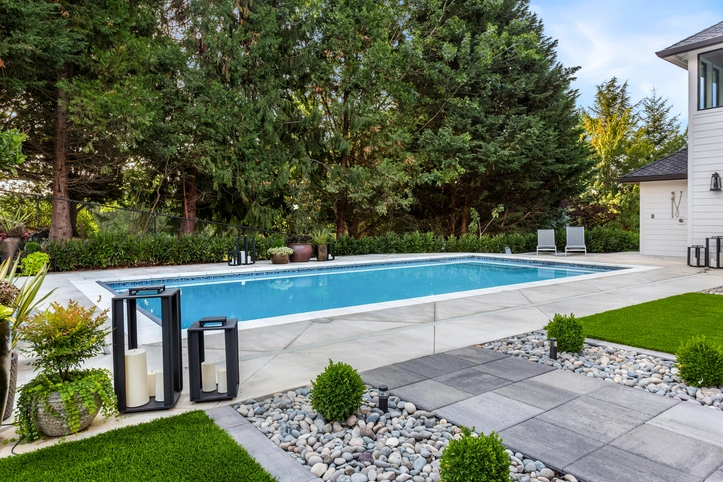
Summer in South Jersey means backyard barbecues, long sunny days, and quality time by the pool. If you have a pool at home, you know how much joy it brings to friends and family. But along with the fun comes responsibility, especially involving plumbing care. Pools, while a great feature, can pose unique challenges to your home’s plumbing system. With a bit of attention and regular maintenance, you can avoid plumbing headaches and keep your poolside fun running smoothly.
Our experienced plumbers at Mr. Rooter Plumbing® of South Jersey offer some practical plumbing tips every pool owner in the area should know.
1. Keep Your Drainage System in Check
Proper drainage is essential for any outdoor space and is even more important if you have a pool. Pool areas see a lot of splashes and spills, which can create standing water. If this water isn’t directed away from your home, it can lead to soil erosion, flooded basements, or even damage your home’s foundation.
To prevent these issues, do the following:
- Inspect and clean your drains regularly – Leaves, dirt, and debris can clog poolside drains, reducing efficiency and causing water to pool in unwanted areas.
- Install or maintain a pool deck drainage system – A well-designed system ensures excess water flows away from your pool area and your home.
- Ensure proper grading in your yard – If water isn’t naturally flowing away from your house, you might need to regrade your lawn to prevent water-related damage.
You can avoid costly plumbing issues by staying on top of drainage maintenance.
2. Watch for Pool Chemical Effects on Plumbing
Pool chemicals are fantastic for keeping your water sparkling and inviting, but they aren’t friendly to pipes. Chlorine, bromine, and other sanitizers can corrode pipes over time, particularly if you’re draining or backwashing your pool into areas connected to your home’s plumbing.
Here’s how to avoid the risks:
- Don’t use your home’s plumbing to dispose of pool water – Always direct drained water to a safe location that won’t damage nearby pipes or local water systems.
- Avoid over-chlorination – Pool water with excessive chemicals can increase wear and tear on your pool's plumbing and any outdoor pipes it might come into contact with.
- Inspect pool plumbing for leaks – Keep an eye on PVC piping and connections, as chemical degradation can weaken them over time.
Being mindful of how pool chemicals interact with plumbing can help keep your pipes functioning and reduce the chance of unexpected repairs.
3. Monitor Your Pool Pump and Filter
Your pool pump and filter play a key role in keeping your water clean, but they also impact your home’s plumbing system. These components maintain proper circulation, which helps prevent stagnant water (a perfect breeding ground for algae and bacteria).
You should always:
- Inspect your pool pump for proper function – A malfunctioning pump can cause uneven water flow and pressure, which stresses your plumbing.
- Backwash your filter as recommended – Clogged filters don’t just affect water clarity; they also lead to unnecessary strain on your pool’s plumbing.
- Check for leaks around your pump housing – Even the smallest leaks can waste water and lead to larger problems.
Regular inspections and maintenance of your pool’s pump and filter can help ensure uninterrupted poolside fun.
4. Prevent Tree Root Intrusion
If your backyard has beautiful trees surrounding your pool, you’ve likely benefited from their shade on a hot day. However, those roots can be trouble for your pipes. Tree roots seek water and nutrients, making your home’s plumbing system a potential target.
Protect your pipes by:
- Planting trees and shrubs away from underground plumbing – Before landscaping, be mindful of where water and sewer lines are located.
- Scheduling regular plumbing inspections – A video inspection can help pinpoint root intrusion before it becomes a serious problem.
- Considering root barriers – These physical or chemical barriers can prevent roots from reaching your pipes.
Showing your pipes some extra care can save you from costly damage caused by invasive roots.
5. Use a Professional for Pool Plumbing Repairs
When it comes to pool plumbing maintenance or repairs, it’s always wise to call a professional. Pool systems have many components, and diagnosing an issue isn’t always straightforward. A trained plumber can partner with you to address the problem and recommend the best options.
Whether you notice a drop in water pressure, frequent leaks, or strange noises around your pool, bring in an expert to ensure everything gets back in order quickly and correctly.
6. Seasonal Shutdown and Start-Up Tips
Proper preparation is crucial for your pool and the surrounding plumbing if you close your pool during the colder months. Similarly, opening your pool each spring takes careful thought to prevent plumbing damage.
Perform seasonal closing tasks, such as:
- Winterizing outdoor plumbing – Drain pool-side faucets or pipes to avoid burst pipes during freezing temperatures.
- Testing for leaks when restarting in spring – After seasonal downtime, check your plumbing system for any unnoticed damage.
These seasonal habits keep your plumbing and pool in top-notch condition, year-round.
Trust Mr. Rooter Plumbing of South Jersey for Summer Plumbing Assistance
Owning a pool in South Jersey is an excellent way to make lasting summer memories. Proper plumbing care and regular maintenance can prevent minor issues from turning into major ones. From ensuring proper drainage to protecting pipes from chemical damage, these tips will help you enjoy your pool worry-free.
If you need expert advice or professional plumbing assistance, don’t hesitate to reach out to Mr. Rooter Plumbing of South Jersey. Your summer should be filled with fun and relaxation—not plumbing problems!
Request an estimate from our professional and experienced plumbers today.

